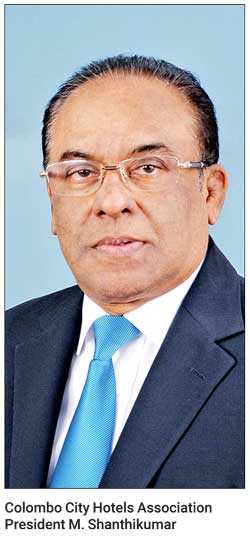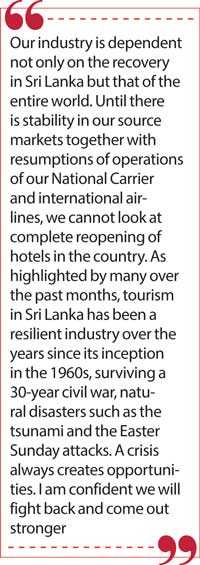Saturday Feb 28, 2026
Saturday Feb 28, 2026
Tuesday, 19 May 2020 00:00 - - {{hitsCtrl.values.hits}}
Colombo City Hotels Association President M. Shanthikumar in this interview provides insights into what the properties in Colombo, which account for 25% of the total star class accommodation in the country, have been facing due to the COVID-19 pandemic as well the short to medium challenges. He describes the current situation as “dire,” with zero revenue, whilst incurring cost for maintenance and retention of staff. Shanthikumar, who is the Director Operations of Ramada by Wyndham Colombo, stresses that financial support, including to pay wages, from the Government is critical to prevent hotels from total collapse. Here are excerpts:
Q: Do you agree with the majority of the industry stakeholders and THASL that this virus outbreak is a double blow to the industry which was suffering from the adverse effects of the 2019 Easter Sunday attacks?
A: Yes, I fully agree. The last year was one of the worst years for our sector in the last 10 years. The months following the attacks were a struggle in terms of business and trying to come to terms with losing our dear colleagues and guests. Unfortunately, the start of Sri Lanka’s tourism season in 2019 coincided with the news of the outbreak of COVID-19 in China. China is a key market for us and by the end of 2019 we had no Chinese tourists arriving. As the virus spread across the world, we experienced a slowdown of tourist arrivals which has come to a standstill now.
Q: How do Colombo hotels plan to sustain the sector?
A: The situation is dire at the moment. Hotels are running on zero revenue while costs are being incurred to maintain hotels. Maintaining a hotel runs into millions of rupees and most companies will struggle to bear these costs for an indefinite time. It’s important to note that the hotel industry has a large workforce and the livelihood of the staff and their loved ones are dependent on a quick recovery.
Until the curve is flattened, social distancing will be the norm, which leaves the sector with no options for revenue from domestic clients either.
Sri Lanka as a nation has controlled the spread well so far and we may be equipped to rebound faster than most other countries. Having said this, keeping our borders closely monitored and conducting stringent health and safety checks in order to allow foreigners into our country will be mandatory to keep our country and its citizens safe. Health and safety checks on all staff working at the hotels will be mandatory.
Q: What is the present status with regard to Colombo city hotels?
A: Properties in Colombo account for 25% of the total inventory in the country. Ranging from 5-star to 1-star plus, the city has a diverse range of operators including international brands, local brands, home stays, apartments, villas, hostels, etc. At present, most of these are closed or partially closed.
Q: What have you done with the staff?
A: Well, with the imposition of curfew and all borders being closed, in reality the staff did not have any work. The Government guidelines requested for them to be home. Therefore, the majority of them have been sent home. A few hotels are working with a skeleton staff to maintain the products. The challenge as mentioned earlier is to maintain the payroll costs over a period of time.
The Hotels Association of Sri Lanka (THASL) has requested the Government for a financial wage support scheme for six months. It’s imperative that we get this to avoid large-scale layoffs. We have made our submissions and are awaiting a response.
Q: Do the Colombo hotels have any plans of opening the properties once the curfew is lifted? Will it be back to business as usual?
A: Yes, hotels will open but the exact capacity with which they will operate is to be decided. The entire supply chain of the tourism sector has to be activated. If there is normalcy and stability within the country, then the hotels in Colombo are bound to open even with limited offerings as they are hoping for a pent-up demand for the restaurants. But business certainly will not be back as usual. The return to normalcy will be staggered. Hence, we need to strategise accordingly. We are certainly going to see a new way of operating hotels going forward.
Q: Colombo hotels are a popular venue for large-scale events such as weddings and conferences and they form a substantial part of the revenues, especially in the 5-star luxury city hotels?
A: I believe the timeline to be able to host large gathering such as conferences and weddings will be long-term. Even at that point practicing social distancing will be mandatory.
Q: What are the hotels doing during this lockdown period?
A: Most hotels are closed or partially closed due to the inability to incur the costs during the lockdown period. A couple of hotels have a few guests who were not able to leave the country before the borders were shut. These hotels are operating at a smaller capacity. All companies are working through scenarios on how to best handle their financials in order to avoid permanent closure of their respective hotels and hotel companies.
Q: What do you consider as your key challenges for Colombo city hotels due to the outbreak of COVID-19?
A: The immediate challenge is how to handle the payroll cost of these hotels. We must get a redress from the Government with a grant for a wage support scheme for the entire hotel sector.
Q: What is your recovery plan?
A: a) We will support the initiatives that SLTDA/SLTPB propose to entice travellers to visit Sri Lanka once normalcy is established.
b) The entire hotel industry will have a new set of health and safety guidelines in place to protect our employees once they return to work and to protect our valued guests. We are confident we will implement same with the least amount of inconvenience to the guests.
c) Each company will prepare a plan on how they will handle the business for the next two years based on certain assumptions which will have to be made over the next two months.
Our industry is dependent not only on the recovery in Sri Lanka but that of the entire world. Until there is stability in our source markets together with resumptions of operations of our National Carrier and international airlines, we cannot look at complete reopening of hotels in the country.
As highlighted by many over the past months, tourism in Sri Lanka has been a resilient industry over the years since its inception in the 1960s, surviving a 30-year civil war, natural disasters such as the tsunami and the Easter Sunday attacks. A crisis always creates opportunities. I am confident we will fight back and come out stronger.